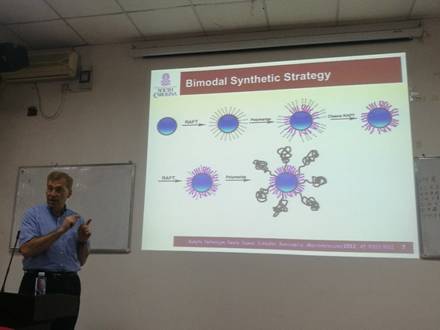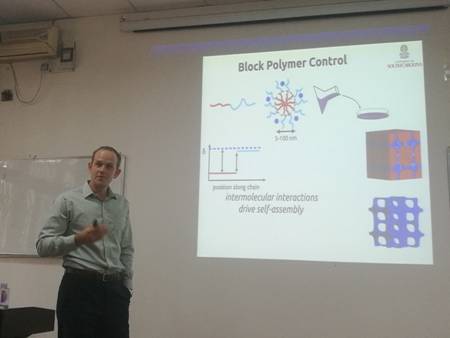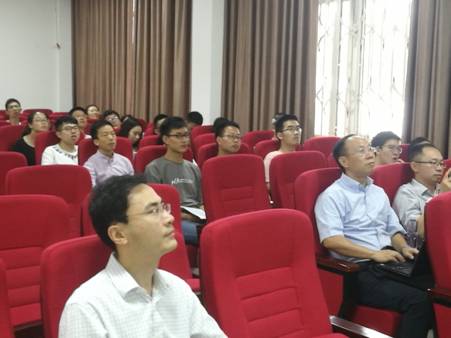2019年7月8日,应四川大学高分子科学与工程学院谭鸿教授邀请,Polymer杂志编辑唐传兵教授,南卡罗来纳大学Brian C. Benicewicz教授,Morgan Stefik教授来到我院,为我院师生作学术报告。医用高分子材料及人工器官系主任李建树教授主持报告。
唐传兵教授做了题为“Metallo-Polyelectrolytes: Chemistry, Self -Assembly and Materials”的专题报道,重点介绍了含Co、Fe等金属复合的聚电解质材料的性能和结构设计思路。通过带正电性的金属离子与含阴离子基团的药物发生相互作用增强了药物的作用效果,在材料形态控制和抗菌性能等方面都表现出独特的性质。Brian C. Benicewicz教授做了题为“Polymer Grafted Nanoparticles for Interface Design, Controlled Ordering and Nanocomposite Properties”的专题报道,重点介绍了采用RAFT聚合控制纳米粒子接枝多种不同组成成分的高分子,通过控制接枝密度、分子量、化学成分等,从而控制纳米粒子表面性质和形态。Morgan Stefik教授做了题为“Kinetic Control of Micelle Templates”的专题报道,重点介绍了利用胶束模板法控制孔径大小和聚合物孔壁厚度的研究成果。该工作利用水来控制聚合反应的动力学,实现了具有相同孔径大小不同孔壁厚度的高分子多孔材料的可控制备。参会的老师和同学们还同三位教授进行了热烈的讨论,并向教授们请教了“金属复合的聚电解质材料的结构稳定性”、“纳米材料表面基团间相互作用”和“自组装工艺”等问题。
唐传兵教授一行还听取了我院部分师生的近期工作介绍,并提出了许多宝贵意见。通过交流,老师和同学们都受益匪浅。

唐传兵教授

Brian C. Benicewicz教授

Morgan Stefik教授

我院师生认真听取专家们的报告

唐传兵教授一行与我院部分师生交流
附:
唐传兵教授:Dr. Chuanbing Tang received B.S. from Nanjing University, M.S. and Ph.D. from Carnegie Mellon University, and worked as a postdoctoral scholar at the University of California Santa Barbara. He joined the University of South Carolina in August 2009. Currently he is a Distinguished Professor at the College of Arts and Sciences, Department of Chemistry and Biochemistry. His research interests focus on organic polymer synthesis, sustainable polymers and biomaterials from biomass, metal-containing polymers, and polymers for advanced applications. He is a recipient of Presidential Early Career Award for Scientists and Engineers (PECASE). He is a Fellow of Royal Society of Chemistry, a POLY Fellow of American Chemical Society, and a Kavli Fellow of National Academy of Sciences. He also won South Carolina Governor's Young Scientist Award for Excellence in Scientific Research, National Science Foundation Career Award, ACS Local Section Outreach Volunteer of the Year Award, and USC Distinguished Undergraduate Research Mentor Award. He is currently an Editor for Polymer, and serves or have served on editors or editorial advisory boards of major polymer journals including Polymer Reviews, Macromolecules, ACS Macro Letters, Macromolecular Rapid Communications, Macromolecular Chemistry and Physics, and Green Materials. He has edited one book, published over 140 papers and garnered 14 patents.
Brian C. Benicewicz教授:Brian Benicewicz received his Ph.D. in polymer chemistry in 1980 from the Department of Chemistry and Institute of Materials Science at the University of Connecticut in Storrs, CT working with Professor Sam Huang. He worked at Celanese Research Company, Ethicon, Inc., and Los Alamos National Laboratory before joining Rensselaer Polytechnic Institute in 1997 as Director of the Center for Polymer Synthesis and Professor of Chemistry. Since 2008, he has been in the Department of Chemistry and Biochemistry at the University of South Carolina where he holds the SmartState Chair in Polymer Nanocomposites. His research interests are focused on the development of high temperature polybenzimidazole membranes for fuel cells and electrochemical devices, and reversible addition-fragmentation chain transfer (RAFT) polymerization, particularly for the preparation of multifunctional nanoparticles and biomedical applications. His work on PBI membranes has been commercialized and is being used in fuel cell devices manufactured by multiple companies for portable and stationary applications.
Morgan Stefik教授:Morgan Stefik obtained a B.E. in Materials Engineering from Cal Poly SLO in 2005 and a Ph.D. in Materials Science from Cornell University in 2010. After postdoctoral research at École Polytechnique Fédérale de Lausanne, he joined the University of South Carolina in 2013 in the Department of Chemistry and Biochemistry. He was awarded an NSF-CAREER in 2018 and is the founding director of the South Carolina SAXS Collaborative. He was highlighted as a “rising star of materials chemistry” by RSC in 2017, was recognized as a Breakthrough Star by USC in 2018, and became an elected council member of the International Mesostructured Materials Association in 2018. He was promoted to Associate Professor with tenure in 2019.